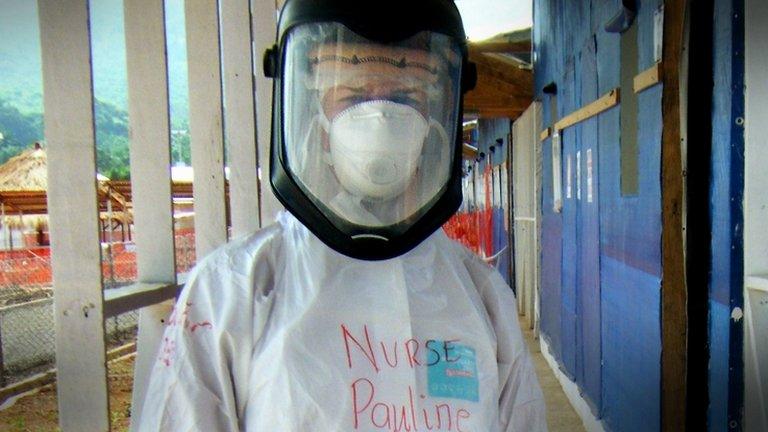Ebola nurse Pauline Cafferkey 'not dishonest', hearing told
- Published
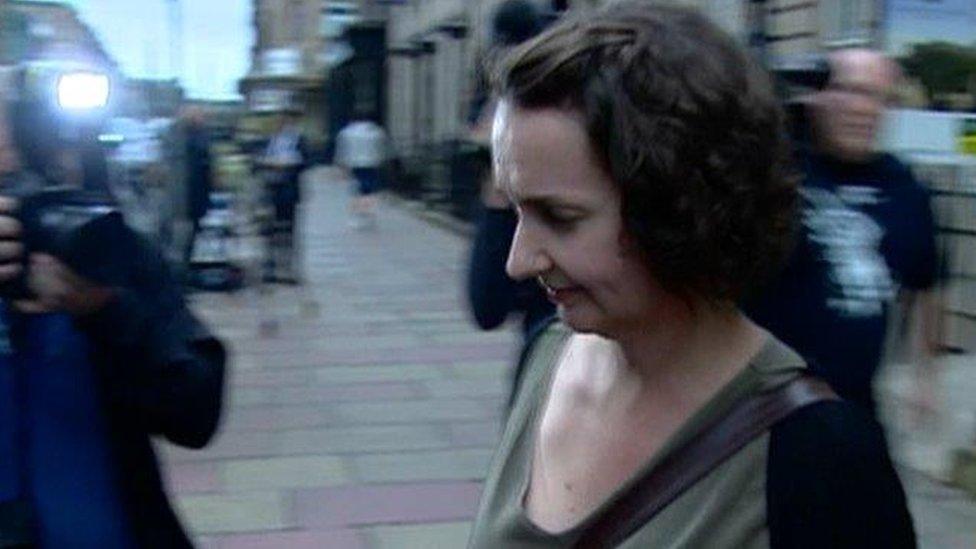
Pauline Cafferkey leaves the Nursing and Midwifery Council hearing in Edinburgh
A Scots nurse who survived Ebola will not face charges of dishonesty at a misconduct hearing.
Pauline Cafferkey, 40, was infected while working in Sierra Leone in 2014.
The Nursing and Midwifery Council (NMC) is alleging that Ms Cafferkey allowed a wrong temperature to be recorded when she returned to Heathrow and she left a screening area without flagging it up.
But it said she had no case to answer over dishonesty and that her judgement had been impaired due to illness.
The panel at the conduct and competence committee agreed to drop charges about "dishonesty" after the NMC agreed that medical evidence clearly showed Ms Cafferkey's decision-making was impaired due to illness on her return from Sierra Leone.
This means that the NMC will now make submission on two charges relating to Ms Cafferkey on her return to the UK on 28 December 2014.
The first alleges that while in a Public Health England screening area, inside Terminal 4 at Heathrow, she allowed an incorrect temperature to be recorded on her screening form.
The second charge alleges that she left the screening area without reporting her true temperature to medics.
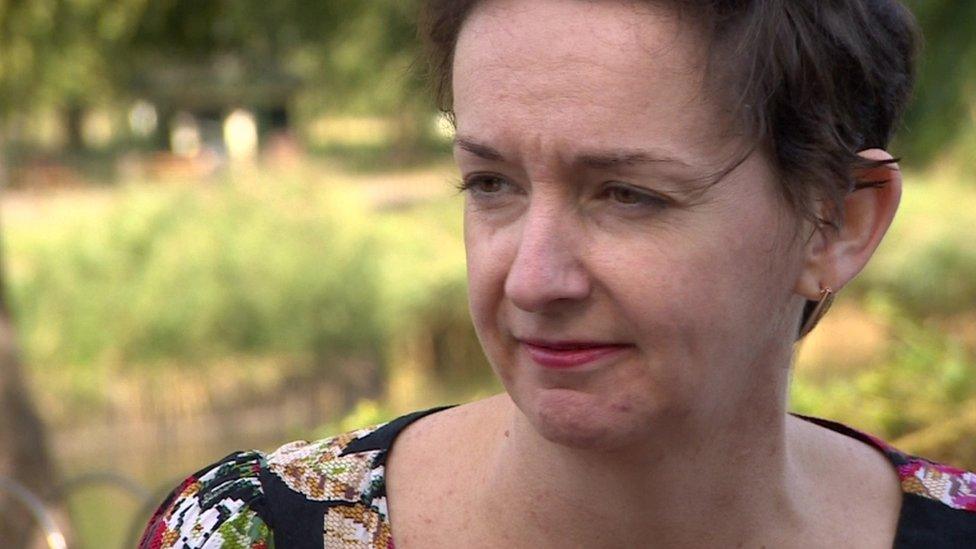
During Tuesday's morning session, the panel heard that the screening area at Heathrow airport was "busy, disorganised and even chaotic" when Ms Cafferkey and other medics arrived back from Sierra Leone.
The agreed facts in the case, as presented to the panel, show that the nurse's temperature was recorded twice by a doctor at Heathrow at more than 38C. This was in the presence of another person referred to as "registrant A".
The doctor claims that "registrant A stated at this point that she would record the temperature as 37.2C on Ms Cafferkey's screening form and then they would 'get out of there and sort it out'".
The agreed facts show that Ms Cafferkey stated that she recalled the words "let's get out of here" being used but could not remember who said it or who entered the temperature on her screening form.
The panel was told that Ms Cafferkey accepted that her temperature had been measured at above 38C yet allowed a reading of 37.2C to be recorded on her screening form, after which she continued to the arrivals area.
It was heard that a temperature above 37.5C "is an elevated or pyrexial (feverish) temperature that requires further assessment and should be reported to a consultant".
'Severe viral load'
Ms Cafferkey admitted taking paracetamol at some point after she realised she had an elevated temperature.
When she returned to the screening area, the doctor who examined her found her temperature to be normal and cleared the nurse to fly back to Scotland.
The panel heard that hours later she was diagnosed with one of the most severe viral loads of Ebola ever recorded.
Doctors said early symptoms would have impaired her judgement and that there was no evidence she had been deliberately dishonest to staff.
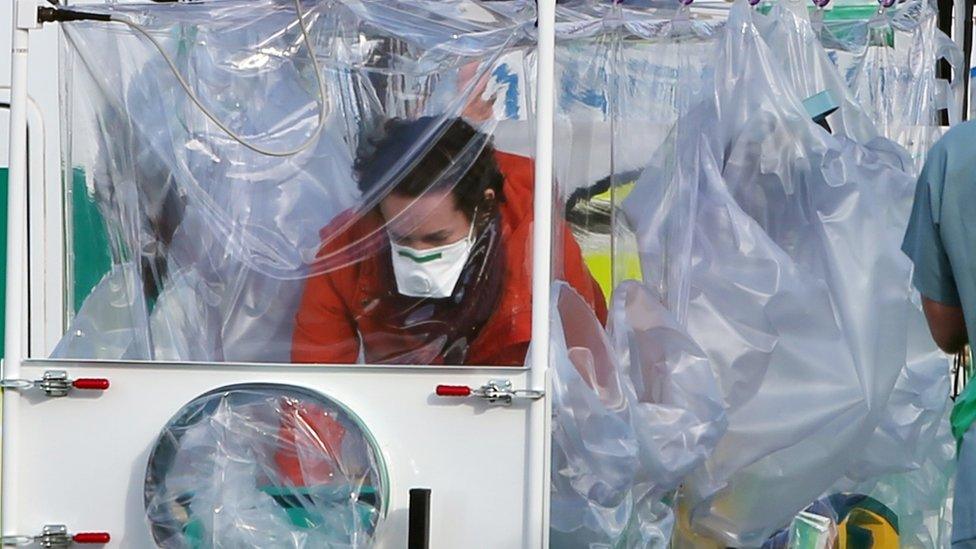
Pauline Cafferkey had to be kept in isolation while being flown for treatment in London
At the hearing, the NMC's representative said there was no question that Ms Cafferkey and other Ebola doctors were acting for the public good.
But she said they had to ensure they did not cause any risk to others.
She said Ms Cafferkey would have understood the importance of temperature checks and the expectation was that a nurse should "fully cooperate" and disclose her symptoms.
The NMC rep said there were "significant mitigating factors" but the fact Ms Cafferkey did not disclose a symptom of Ebola still "amounts to misconduct".
She said Ms Cafferkey was guilty of "unacceptable professional behaviour" by potentially putting the public at risk.
Pauline Cafferkey's lawyer, Joyce Cullen, argued that her actions did not amount to misconduct.
She said the nurse should be viewed as a patient from the moment the first doctor took her temperature.
She added that Ms Cafferkey "was not acting in a professional capacity" when the incorrect temperature was recorded at Heathrow.
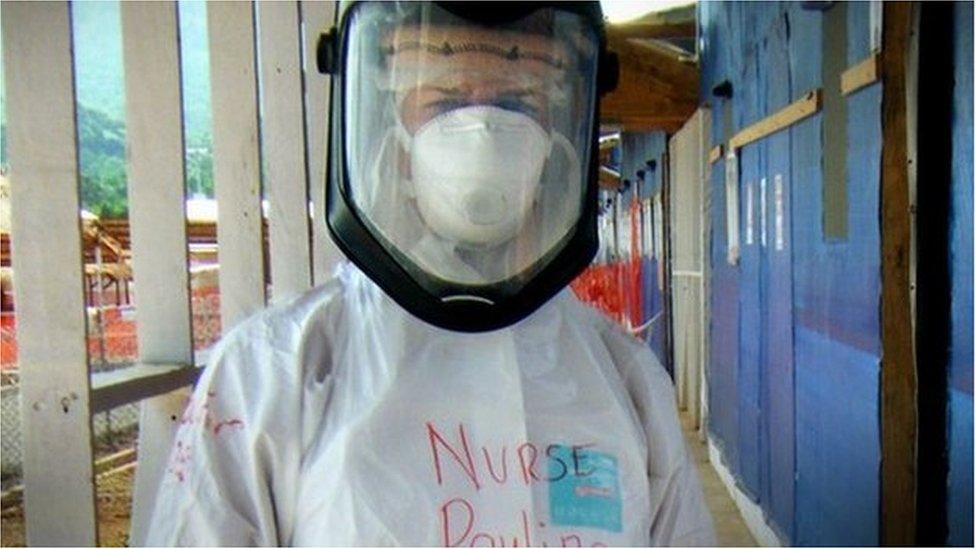
Ms Cafferkey contracted Ebola while working at a treatment centre in Sierra Leone two years ago
Ms Cafferkey's lawyer pointed to past definitions of misconduct as "usually involving" dishonesty.
She said Ms Cafferkey's ability to assess her own medical condition and make decisions was likely to have been "substantially impaired".
The lawyer said Ms Cafferkey was an Ebola expert with "impeccable record" and it was "so unlikely" that her actions were deliberate.
She also pointed to the "chaotic" scenes at the Heathrow airport screening process.
The NMC had originally alleged that Ms Cafferkey "allowed an incorrect temperature to be recorded" on 28 December 2014 and intended to conceal from Public Health England staff that she had a temperature higher than 38C.
The nurse, from Halfway, Cambuslang, contracted the virus while working as part of a British team at the Kerry Town Ebola treatment centre in 2014.
She spent almost a month in isolation at the Royal Free at the beginning of 2015 after the virus was detected when she arrived back in the UK.
Ms Cafferkey was later discharged after apparently making a full recovery, and in March 2015 returned to work as a public health nurse at Blantyre Health Centre in South Lanarkshire.
In October last year it was discovered that Ebola was still present in her body, with health officials later confirming she had been diagnosed with meningitis caused by the virus.
However in the months that followed, her health suffered as she had issues with her thyroid, her hair fell out and she had headaches and pains in her joints.
But Ms Cafferkey stressed that she felt lucky because she had not lost her sight as others had done.
The hearing was adjourned until Wednesday.
- Published18 August 2016
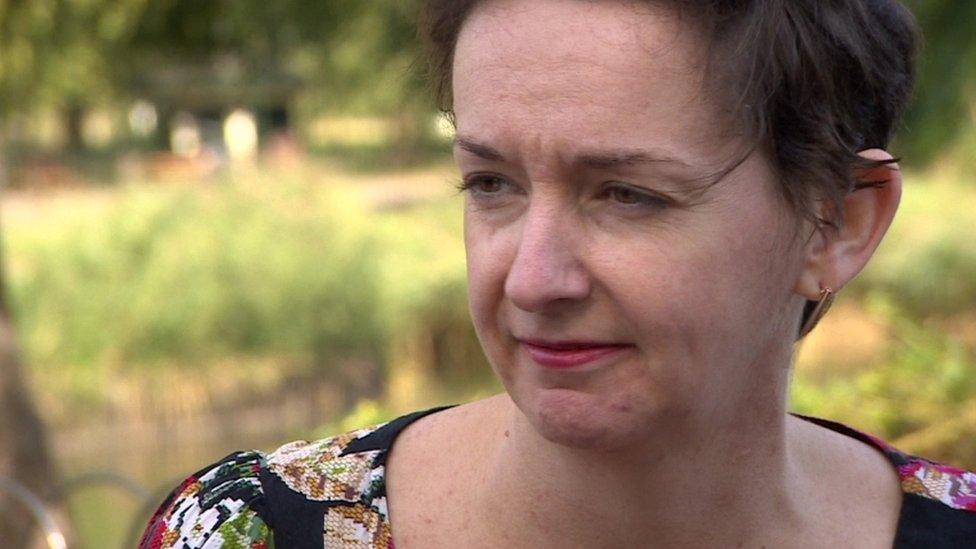
- Published18 August 2016
